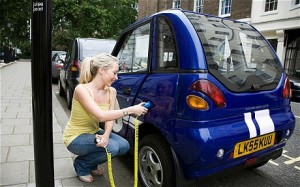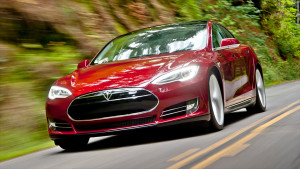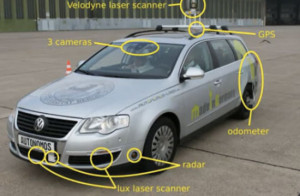 All of the major auto manufacturers are offering some form of electric cars these days. Some are hybrid cards while others are electric only. Hybrid cars run on both gasoline engines as well as electricity. Most recharge the batteries utilizing the engine, the brakes etc to recharge the batteries. Electric cars on the other must be recharged each night. Or after discharging the batteries over a 40 or 60 mile trip depending on the what they are rated for and how you drive. The problem for many prospective new electric car owners is were do I charge my Electric Car’s batteries and who will pay for the cost!
All of the major auto manufacturers are offering some form of electric cars these days. Some are hybrid cards while others are electric only. Hybrid cars run on both gasoline engines as well as electricity. Most recharge the batteries utilizing the engine, the brakes etc to recharge the batteries. Electric cars on the other must be recharged each night. Or after discharging the batteries over a 40 or 60 mile trip depending on the what they are rated for and how you drive. The problem for many prospective new electric car owners is were do I charge my Electric Car’s batteries and who will pay for the cost!
If you pay for your own electricity were you live, then there is usually no problem. But what do you do if you share the cost of electricity as in a condo or apartment building? What if there are no places to plugin your electric car for the night? then what do you do?
A Primer on Electric Car Recharging Systems
Some electric cars have two different charging systems. One system will accept 120-volt and the other will accept 240-volt power from a normal electrical outlet.
The normal 115 volt household charging system has the advantage of convenience — anywhere you can find an outlet, you can recharge. The disadvantage is charging time and what the owner of the outlet thinks about it.
A typical household 120-volt outlet has a 15-amp circuit breaker. This means that the maximum amount of energy that the car can consume is approximately 1,500 watts, or 1.5 kilowatt-hours per hour. The battery pack in a typical car needs 12 to 15 kilowatt-hours for a full recharge. So it can take 10 to 12 hours to fully charge the vehicle using this technique.
By installing a 240-volt circuit (such as the outlet for an electric dryer)(you will need an electrician to install this circuit). The car might be able to receive 240 volts at 30 amps, or 6.6 kilowatt-hours per hour. This connection provides significantly faster charging, and can fully recharge the battery pack in four to five hours.
What does it Cost to Recharge
Electricity in Ontario, Canada is 18 cents per kilowatt-hour at peak and 8.7 cents per kilowatt-hour at night. Assuming a full charge of 15 KW’s, it will cost you $2.7 during the day or $1.30 at night to recharge your car. Assuming 80 miles on a full battery, the cost per mile is therefore 1.63 cents per mile, assuming off peak charging. Gasoline costs $3.60 per gallon on average at time of writing this post. If we assume a car gets 30 miles to the gallon, then the cost per mile is 12 cents per mile for gasoline. A huge Savings!
Let’s assume you drive your car on average 15,000 miles per year, then the savings in gasoline alone would be $1635.00. Now while you are achieving these savings, someone has to pay for the electricity you are using if you are not recharging from your own homes system.
Were Do I Charge My Electric Car’s Batteries
So where will you recharge your car’s batteries? At home of course, but there may be other places as well, such as:
- While visiting a friend
- At work
- In a condo or apartment complex parking lot
- Public recharging places
While we are not talking about a lot of money, many people are going to not like the idea that they are paying for you to recharge your car. That is just the way people are and there is not much you can do about it. So if you are visiting a friend for the evening or for a few days, do you plug in your car? Do you offer to pay for the electricity? We think that yes you should and you should have available the calculations to show just how much you will be using. We also think that most people will say, forget it when they see what it actually costs to recharge your cars batteries.
Some work locations will offer recharging as an incentive and a public relations incentive, so take advantage of this feature when it is offered. Otherwise you may have to negotiate with the property manager to allow you to plug in and recharge your cars batteries.
Read the rest of this entry »
 Can you imagine that you are just about to unveil your latest designs at the Detroit auto show. Then the Feds announce that there is a recall associated with your flagship car! This Tesla recall came at the wrong time.
Can you imagine that you are just about to unveil your latest designs at the Detroit auto show. Then the Feds announce that there is a recall associated with your flagship car! This Tesla recall came at the wrong time.

 Are electric cars a fad that will go away over time? Are driverless cars another fad that will go away over time? We think that both of these form part of the future. Many of these kinds of things are developed. As a result they evolve into something that we’re not quite prepared to accept initially! Remember the horseless carriage! It was supposed to never go beyond becoming a novelty. Something that the rich would use. Consequently after 10 or 15 years horses and buggies began to disappear in favor of horseless carriage.
Are electric cars a fad that will go away over time? Are driverless cars another fad that will go away over time? We think that both of these form part of the future. Many of these kinds of things are developed. As a result they evolve into something that we’re not quite prepared to accept initially! Remember the horseless carriage! It was supposed to never go beyond becoming a novelty. Something that the rich would use. Consequently after 10 or 15 years horses and buggies began to disappear in favor of horseless carriage. We think there is a market for electric cars and so does Tesla who sells a high-end electric vehicle, the Model S. Their success has identified the emerging market problem of recharge stations. Now all of the car manufacturers are getting on board announcing new electric car models. They will solve the battery problem but in the meantime? What do you do when your batteries run down?
We think there is a market for electric cars and so does Tesla who sells a high-end electric vehicle, the Model S. Their success has identified the emerging market problem of recharge stations. Now all of the car manufacturers are getting on board announcing new electric car models. They will solve the battery problem but in the meantime? What do you do when your batteries run down?